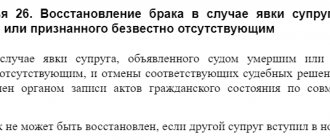- Marriage and family relations Concept, sources and basic principles of family law
- Family legal relations: subjects, grounds for emergence and termination
- The procedure for concluding and ending a marriage
- Personal non-property and property rights and obligations of spouses
- Exercise and non-exercise of family rights. Violation of duties by subjects of family legal relations
Marriage and family relations
One of the most important social institutions is the family. In the family, a person receives an upbringing, is formed as a person, enters into a complex circle of social relations, and becomes a citizen.
In the legal sense, a family is a circle of persons whose mutual rights and obligations arise in connection with consanguinity, marriage, adoption or other form of foster care.
Let's consider the concept of family law, its principles and sources.
Concept, sources and basic principles of family law
Family law is a branch of private law, a set of rules governing personal (non-property) and related property relations arising from kinship, marriage, adoption and other forms of taking children into a family for upbringing, as well as the establishment of guardianship (trusteeship) .
The place of family law in the legal system is determined by the characteristics of its subject of legal regulation and the subjects of relations.
Firstly, marriage and family relations arise from special legal facts:
- marriage;
- kinship;
- motherhood;
- paternity and some others.
Secondly, the subjects of these relations play specific roles:
- parents;
- children;
- guardians;
- spouses, etc.
Thirdly, family relationships are of a personal nature.
Fourthly, the equality of the parties is declarative in nature, since one party is actually unequal to the other party, for example, incapacitated, minors and other subjects are involved in a number of legal relations.
When considering the sources of family law, it is necessary to pay attention to the fact that, like other branches of law, it is regulated not only by the legislation of the Russian Federation, but also by those international treaties that are ratified by Russia.
The sources of family law in the Russian Federation are:
- Constitution of the Russian Federation;
- Family Code of the Russian Federation;
- Convention on the Rights of the Child of November 20, 1989;
- Convention on Legal Assistance and Legal Relations in Civil, Family and Criminal Matters of 22 January 1993;
- Agreement of the CIS member states of September 9, 1994 “On guarantees of the rights of citizens in the field of social benefits, compensation payments to families with children and alimony” and other legal acts regulating family legal relations.
The Constitution of the Russian Federation proclaims state protection of the family.
The Family Code of the Russian Federation is of greatest importance in the system of Russian legislation.
Along with the RF IC, the system of family legislation includes other federal laws adopted in accordance with it, containing norms of family law.
Subjects of the Russian Federation have the right to adopt laws related to family law, but only on issues that are within their jurisdiction or are not regulated by the legislation of the Russian Federation.
The by-laws of family legislation include, first of all, decrees of the President of the Russian Federation, which must comply with legislative acts. Family law norms may be contained in decrees of the Government of the Russian Federation.
Some family relationships are affected by the Civil Code of the Russian Federation, the Criminal Code of the Russian Federation, and the Housing Code of the Russian Federation.
Let's consider the basic principles of regulating family legal relations:
- the inadmissibility of arbitrary interference by anyone in family affairs (no one has the right to indicate to parents the methods of raising children (unless, of course, we are talking about cruelty), no one can determine the material and everyday organization of the family, etc.; the Constitution of the Russian Federation provides for the right on family secrets (this is a guarantee of protecting the secret of the adoption of a child));
- voluntary marriage between a man and a woman;
- equality of spouses in resolving all issues of family life;
- full protection of the interests of mother and child;
- ensuring priority protection of the rights and interests of minor family members.
What are family legal relations, how do they arise and end?
Family legal relations: subjects, grounds for emergence and termination
Family legal relations arise from such legal facts as events, and especially from such varieties as states. Since legal events give rise to legal consequences beyond the will of a person, the content of family legal relations (that is, the mutual rights and obligations of their participants) is also formed not by the will of its participants, but by virtue of the instructions of the law. Subjects of family legal relations generated by events, as a rule, cannot change their content of their own free will. This is how, for example, the relationship between parents and children arises.
Some family relationships (for example, marriage and family) arise at the will of their participants.
Family legal relations are ongoing, which is determined by the goals and objectives that are determined by creating a family, raising children, and providing for disabled family members.
The circle of persons who can be participants in family legal relations is clearly defined by law. They can only be citizens in special qualities:
- spouses;
- children;
- parents;
- grandchildren, etc.
Family relationships are personal.
The subjects of family relations are only citizens, because other subjects (state bodies, legal entities, etc.) do not participate in these legal relations.
Family legal capacity is the ability of citizens to have family rights and bear responsibilities. Its content: the right to enter into and terminate marriage, the right of parents to raise children, the right of a child to live and be raised in a family, etc.
Family capacity is the ability, through one’s actions, to acquire and exercise family rights, as well as to create and fulfill family responsibilities for oneself. Full family legal capacity begins at the age of 18. In the event of marriage of persons whose marriageable age has been reduced, these persons independently exercise all the rights and obligations of the spouses. Unmarried minors, in the event of the birth of a child and when their maternity (paternity) is established, have the right to independently exercise parental rights upon reaching 18 years of age.
The objects of family legal relations are divided into two groups: personal non-property relations and personal property relations.
Personal non-property relations have intangible benefits as their object:
- Name;
- choice of place of residence;
- personal integrity;
- personal dignity, etc.
The objects of property family legal relations are material benefits:
- property belonging to their participants;
- means of material support that some participants in these relations must provide to others.
Let's consider the procedure for entering into and ending a marriage.
The procedure for concluding and ending a marriage
Marriage is a voluntary, equal union of a man and a woman, concluded in compliance with certain rules for the purpose of creating a family.
Russian legislation only recognizes monogamous marriage, i.e. monogamous union of a man and a woman. The principle of freedom of marriage applies. This means that marriage and its dissolution must be based on the free will of the parties. A marriage performed under physical or mental coercion or based on remnants of local customs may be declared invalid.
One of the main features of marriage is its completion in the manner and form established by law. Russian legislation only recognizes marriages registered with the civil registry office. Many people, when getting married, along with state registration, formalize their relationship according to a religious rite. However, the religious procedure does not influence the fate of the marriage and does not replace state registration.
The legislation establishes the conditions for marriage:
- mutual voluntary consent of persons entering into marriage;
- reaching the age of 18.
- Marriage may be hindered by:
- the presence of another unresolved marriage;
- close relationship in a direct line (a marriage cannot be concluded between an adoptive parent and an adopted person with a person incapacitated due to mental illness).
The invalidity of a marriage is recognized by the court if, during the marriage, the conditions for marriage were violated or there were obstacles to its conclusion.
Marriage is concluded at the civil registry office, usually within a month after the submission of a joint application by persons wishing to marry.
A de facto marriage is a relationship between persons that meets all the requirements and conditions for marriage, but is not legally registered. An actual marriage cannot give rise to the legal consequences that arise from a registered marriage.
The legislation establishes the following grounds for termination of marriage:
- death of one of the spouses;
- recognition of one of the spouses as deceased;
- divorce at the request of one or both spouses.
In case of divorce, the marriage is considered terminated:
- upon dissolution of marriage in the registry office - from the moment of state registration of divorce in the civil registration book (this dissolution is possible if the spouses do not have common minor children, their desire to dissolve the marriage is mutual, they have no disputes about property; also, if one of spouses are declared incompetent or sentenced to imprisonment for a term of over three years. State registration of divorce is carried out in the presence of at least one of the spouses after a month after filing the application);
- upon divorce in court - from the moment the court decision enters into legal force (the court can decide questions about the place of residence of minor children, the division of property and the determination of alimony; the division of property, as well as determining the amount of maintenance to be paid to one of the spouses, the court makes only at the request of the spouses (or one of them)).
It should be noted that child support collected from parents for children left without parental care and in educational institutions (in the event of deprivation of parental rights) is credited to the accounts of these institutions in order to ensure the legal rights and interests of the children.
Alimony for minor children is collected by the court from their parents on a monthly basis in proportion to the payer’s earnings (income) in the following amount:
- for one child - 1/4;
- for two children - 1/3;
- for three or more children - half the earnings and (or) other income of the parents.
The law gives each of the spouses the right to divorce, with the exception of the case provided for in Art. 17 of the RF IC, which contains a legal norm about the inadmissibility of a husband filing a demand for divorce without the wife’s consent during her pregnancy and within a year after the birth of the child. This restriction applies both when the husband files a statement of claim for divorce in court, and when he applies for divorce to the registry office. It is aimed at protecting a woman during pregnancy and during the year after the birth of a child from unnecessary worries and worries associated with divorce, and therefore at protecting the health of the mother and child.
This restriction also applies to cases where the child was stillborn or did not live to be one year old.
Extramarital family
Extramarital unions are actual unions; they are created by the law itself by fixing the boundaries of marriage. The law fundamentally denies extramarital unions recognition of the nature of legal relations and thereby deprives them of legal protection. Meanwhile, the law regulates the relationship between illegitimate parents and their children. And he does this regardless of whether these laws are favorable to such marriages and children or not. By doing this, the law enters into the realm of extramarital unions and recognizes that their operation has important consequences.
- The regulation of extramarital relations by law follows the following main directions:
- the law regulates the relationship of children born out of wedlock with their illegitimate parents;
- the law clarifies some issues of personal and property interests, as well as the relationship of extramarital partners;
- Without attempting to make extramarital unions impossible in principle, the law imposes prohibitions in cases where an extramarital union may have harmful biological and social consequences.
- prohibitions related to the partner’s personality, that is, his age, relationship or physical and mental state;
- prohibitions regarding the nature of an extramarital union.
Extramarital unions can be classified on various grounds. Yugoslav sociologist M. Bosanz gives a fairly detailed classification of extramarital families:
- according to the subjective characteristics of the partner: a) age - an extramarital union can be organized by two adults, b) civil status - neither of the partners is married; both partners are married, but not to each other; one of the partners is married to a third party and the other is not married;
- Based on publicity, extramarital families can be divided into anonymous and non-anonymous. Anonymous are those extramarital families that, for various reasons, are hidden by extramarital partners from the public environment. From a social point of view, such unions are most undesirable. Non-anonymous extramarital families are those in which the man and woman do not hide their entry into this relationship before the public;
- by duration: casual, short-term relationships; temporary extramarital families and concubinage. Casual short-term relationships are not in the full sense an extramarital family, because they do not perform a number of functions that belong to the family. These connections are most often anonymous and are often unforeseen and unexpected sources of out-of-wedlock births. For society, these connections are extremely undesirable. Temporary extramarital families are those unions that last for some time and, as a rule, are not anonymous. Sometimes they are limited to promises of marriage, and sometimes they end with its conclusion. This is a phase of premarital sexual activity that is increasingly common in modern society. Concubinage (this name has existed since Roman law) is a long-term relationship or a long-standing extramarital family in which the man and woman do not intend to formally consummate the marriage. Among extramarital families, concubinage occupies a leading place. This is a legal relationship, ethically accepted and justified by a man and a woman. Concubinages are often founded in adulthood by partners who remain unmarried for various reasons. The man and woman in such a family have life experience that helps them avoid acute conflicts that often shock and destroy marital and extramarital unions of young people.
Mutual rights and obligations of spouses, parents and children
The rights and obligations of spouses arise from the moment of state registration of marriage. Let us recall that they are divided into two groups: property and non-property. Let's take a closer look at each group of rights and responsibilities.
Personal non-property and property rights and obligations of spouses
The first group consists of personal non-property rights and obligations of spouses. These include:
- the right to choose a common surname for one of the spouses, a double surname by adding the wife’s surname to the husband’s surname, or to remain with one’s surname;
- the right to jointly resolve all issues of family life and raising children;
- the right to choose a place of residence, choose a profession and occupation.
The second group consists of personal property rights and obligations of spouses, which may have both legislative and contractual regimes. Let us highlight some provisions of family law in this area of relations.
Everything that belonged to each spouse before marriage remains his personal property, and he has the right to independently dispose of this property.
Property acquired during marriage is recognized as the joint property of the spouses, who enjoy equal rights in relation to this property.
Joint property does not include property received by spouses during marriage as a gift or by inheritance, as well as personal items, with the exception of luxury items.
The regime of joint ownership of property of spouses established by law can be changed by a marriage contract.
A prenuptial agreement is a written agreement in which spouses define their property rights and responsibilities during the marriage and in the event of its dissolution.
The purpose of a prenuptial agreement is to change the legal regime of marital property to best suit the needs of the spouses. The parties to such an agreement are persons wishing to marry or spouses. Any other persons have no right to enter into a marriage contract.
The subject of the marriage contract is the property rights and obligations of the spouses, subject to the legal regime of their common property, as well as any other property rights and obligations that may belong to the spouses by virtue of civil law.
A marriage contract is subject to notarization, and if it is concluded before marriage, it becomes valid from the moment the marriage is registered with the registry office. Spouses have the right to determine in the marriage contract also their rights and obligations regarding mutual maintenance, ways of participating in each other’s income, the procedure for each of them to bear family expenses and other issues relating to property relations.
A marriage contract cannot limit equality in marriage, regulate personal rights and obligations between spouses, rights and obligations in relation to children, or contain conditions that place one of the spouses at a severe disadvantage or are contrary to family law.
Let us consider the rights and responsibilities of parents and children that arise as a consequence of family legal relations.
Rights and responsibilities of parents and children
The rights and obligations of parents, when certifying the origin of a child from these persons, arise from the moment the child is born and terminate when he reaches 18 years of age, as well as when the minor marries or is emancipated.
For emancipation, it is necessary that a minor work under an employment agreement or contract or, with the consent of his parents, adoptive parents or guardian, engage in entrepreneurial activity.
The relationship between parents and children usually develops on the basis of consanguinity as a result of the children's descent from their parents. However, the modern level of development of medicine is capable of ensuring the birth of a child not only as a result of biological origin (consanguinity), but also by transplanting an embryo conceived in the body of another woman, artificial insemination, and even growing an embryo in a special chamber. In this regard, relationships based on facts to which the law attaches legal significance are equated to parental ones.
Parental legal relationship is a set of personal and property relations between parents and child regulated by the norms of family law.
The content of the parental legal relationship is formed by the rights and obligations of the parent and his child in relation to each other.
Parents have the right and responsibility to raise their children. They have the right to personal education of their children.
Parents have the responsibility to raise their children mentally, morally and spiritually healthy. They must instill in children a sense of devotion to the Motherland, a conscientious attitude to work, and responsibility to the family. Parents must take care of the physical development of their children, their education and preparation for socially useful activities. They must prepare children for active participation in the affairs of the state and provide financial support to minor children.
Parents are obliged to ensure that their children receive general education, i.e. education in the amount of 11 classes of secondary school. Parents are the legal representatives of their minor children, that is, persons who, by virtue of the powers available by law, carry out transactions and other legal actions on behalf of the represented person.
It is the responsibility of parents to protect the rights and interests of their children. Parents defend the rights and interests of children in relations with any individuals and legal entities, including in the courts, without special powers.
Parents must raise and supervise their children. Education involves instilling certain traits and skills, and supervision involves preventing various negative consequences.
Children have the right to physical and spiritual development, as a result of which they will be able to become full-fledged members of society, participate fruitfully in all areas of life, and most fully satisfy their material, spiritual and cultural needs. The child also has a number of rights:
- for life and upbringing in a family;
- to be cared for and educated by their parents;
- to ensure his interests;
- comprehensive development and respect for human dignity;
- to communicate with your relatives;
- to protect their legal rights and interests;
- for rest and leisure;
- participate in age-appropriate games and recreational activities;
- take part in cultural and creative life, etc.
A child has the right to know his parents, to express his opinion on all matters concerning his life, to receive maintenance and ownership of property that belongs to him.
A separate chapter of the RF IC is devoted to the characteristics of the rights of minor children. Its contents correspond to the Convention on the Protection of the Rights of the Child, ratified by the USSR on June 13, 1990.
Children are assigned by law the responsibility to support and care for their parents. If able-bodied adult children forget about their debt to their parents, alimony in favor of their parents can be recovered from them in court. The amount of alimony is determined depending on the family and financial situation of the parents and children.
Maintenance obligations of adult children arise only in relation to parents who are disabled and in need of help. Parents' inability to work may be related to their retirement age or disability. Neediness is expressed in the lack of funds to provide the parent with a living wage.
When determining the amount of alimony, the court has the right to take into account all adult children of a given parent, regardless of whether a claim is brought against all the children, several of them, or one of them.
If parents have been deprived of parental rights, they cannot demand funds from their children for their maintenance. The court may release children from the obligation to support their parents in cases where it is convinced that the parents, although they were not deprived of parental rights, at one time evaded the upbringing and maintenance of their children.
Let's consider the alimentary obligations of other family members.
Maintenance obligations of spouses and other family members
Not only parents and children, but other family members should also help their family members in need. If children do not have parents or the parents do not have sufficient funds, then the responsibility for supporting the children falls on the grandfather, grandmother, brothers and sisters. These persons are also obliged to support their grandchildren, brothers, and sisters who are adults, but disabled and in need of outside help, if they cannot receive support from their parents or spouses. In turn, grandchildren are obliged to support their grandparents if their children or spouses cannot support them. The law also obliges stepsons and stepdaughters to support their stepfather and stepmother.
Former pupils must pay alimony for the maintenance of their actual educators, if the latter supported and raised them for at least five years and properly, although they did not formalize this upbringing by adoption.
In most of the listed obligations, the alimony payer is, as a rule, an able-bodied person who has all the necessary means. The recipient of alimony, on the contrary, is disabled or has not reached the age of majority.
The amount and procedure for paying alimony may be established by agreement of the parties, or, in its absence, by a court decision. In this case, the financial and marital status of both the payer and the recipient of alimony, as well as other noteworthy interests of the parties, must be taken into account. Alimony is paid monthly in a fixed amount.









